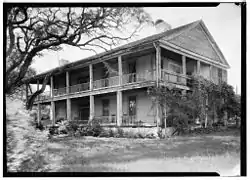Seward Plantation
The Seward Plantation is a historic Southern plantation-turned-ranch in Independence, Texas, United States.
Seward Plantation | |
 John H. Seward House | |
 Seward Plantation  Seward Plantation | |
| Location | 10005 FM 390 E, Independence, Texas |
|---|---|
| Coordinates | 30°19′46″N 96°19′56″W |
| Area | approx. 60 acres (24 ha) |
| Built | 1855 |
| Built by | John H. Seward |
| Architectural style | Greek Revival |
| NRHP reference No. | 12001250[1] |
| Added to NRHP | January 29, 2013 |
Location
The plantation is located one mile (1.6 km) east of Independence near Brenham in Washington County, Texas.[2][3][4] It is off Farm to Market Road 390, also known as La Bahía Road (later Old Washington Road).[3] The La Bahia Road was originally an east-west Indian trail also used by Spanish explorers in the 17th century.[5] One can still see remnants of the La Bahia Road on the Seward Plantation.
History
In 1832–33, Samuel Seward (1794–1870) moved from Illinois to Mexican Texas with Stephen F. Austin.[2][4] He soon purchased 1,700 acres (690 ha) of land,[2][4] then 300 acres (120 ha) more.[2]
In the 1850s (after Texas had become a U.S. state), the land passed to his son, John Hoblett Seward (1822–92), who married Laura Jane Roberts (1838–1920)[2] of Houston. The main house on the plantation was built in 1855.[2][3]
The house was originally built as a one-story building 1/4 mile from father Sam Seward's house. One year after its completion the house was rolled on large cottonwood logs 3/4s of a mile to its current location because the original location was found to be inaccessible during the rainy seasons and unhealthful during the cold seasons. The house was constructed almost entirely from cedar trees growing within sight of the original location. It sits securely on a stone base. The Seward family added a second story soon after the house was moved, and made other additions through the years. After it was enlarged, the plantation home became the largest house in Washington County.[2] The property also included barns, log cabins for slaves,[4] a smokehouse, a corn crib and a blacksmith's shop, many of which are still standing.
It was used as a cotton plantation prior to the American Civil War of 1861–65.[3] After the war, it became a cattle ranch.[3]
The house survived the storm of 1900.[2] The Seward Plantation remained in the Seward family until 2017, when it was purchased by a family from Houston who is restoring the property and using the house as a private home.
Heritage significance
It has been listed on the National Register of Historic Places since January 29, 2013.[4] It was documented as part of the Historical American Buildings Survey.[6] It has a Texas Centennial Marker.[7]
References
- "Weekly List of Actions Taken on Properties: 1/28/13 through 2/1/13". National Park Service. February 8, 2013. Retrieved March 8, 2018.
- "Seward Plantation". City of Independence, Texas. Retrieved October 10, 2014.
- "Recent Listing: Seward Plantation". Texas Historical Commission. Retrieved October 10, 2014.
- "Seward Plantation". City of Brenham, Texas. Retrieved October 10, 2014.
- tsaonline.org
- http://www.loc.gov.pictures/collection/hh/Seward Plantation
- thc.texas.gov/preserve/projects-and-programs/state-historical-markers/1936-texas-centennial-markers
External links
![]() Media related to Seward Plantation at Wikimedia Commons
Media related to Seward Plantation at Wikimedia Commons

